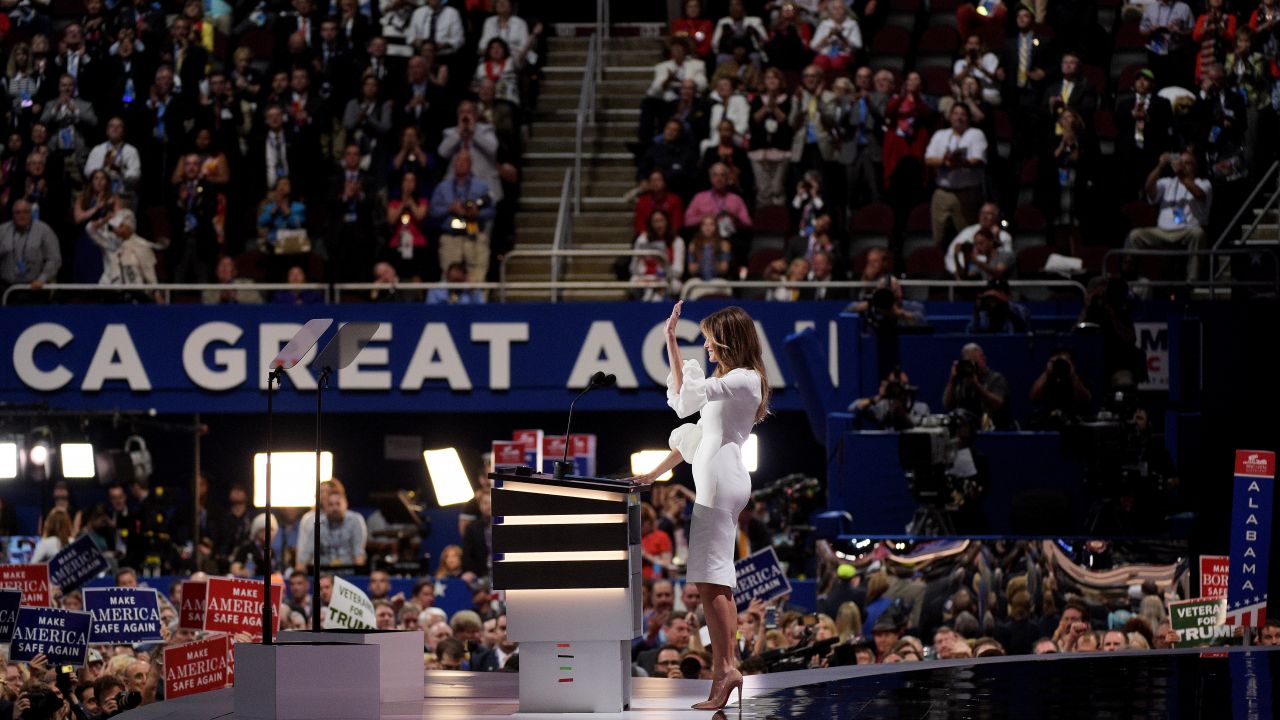
Melania Trump, wife of presumptive Republican presidential nominee Donald Trump, delivered a speech on the first night of the Republican National Convention that echoed one Michelle Obama delivered at her husband's nominating convention eight years earlier. (Photo by Jeff Swensen/Getty Images)
EDITOR’S NOTE: As many experts have observed, this year’s presidential election could come down to a battle for votes Democrats used to take for granted.
Donald Trump is making an overt play for the so-called “Reagan Democrats,” blue collar voters whose defection three decades ago shook up the national political landscape and stoked the Reagan revolution. It’s no accident that Hillary Clinton’s first post-convention foray was into once reliably Democratic steel and coal country. Now, as then, the issues facing these voters are job and income security in a changing world. Only now, those concerns are being felt by far more than the steelworkers and their families whom Ronald Reagan wooed in 1980.
America’s deindustrialized heartland embodies one of the challenges reshaping the nation’s politics: The disappearance of the middle class and the growing gap between the haves and have-nots. That’s why BillMoyers.com is paying particular attention to these communities this year, focusing on their issues and giving voice to the people who live there. You can read more of our collection here.)
In all the uproar about Melania Trump’s plagiarism of Michelle Obama’s 2008 Democratic convention speech — a gaffe worthy of note, of course — we should not ignore the ideals both women touted: work hard, be honest and reliable, respect others, make a better life for the next generation. These are core American values, rooted in the American dream and ideas about equality, opportunity and the Protestant work ethic. They are also core working-class values.

Michelle Obama speaking to the Democratic National Convention in 2008. Photo by Stan Honda/AFP/Getty Images)
In very different campaigns, Trump and Obama used these ideas to stake claims — for themselves and for their husbands — as “real” Americans, as Americans who share the values and commitments of voters, as “good” people. Both also use them to overcome similar challenges: their own differences from the mainstream, including not only gender but also race for Obama, and immigrant status for Trump.
From a young age, my parents impressed on me the values that you work hard for what you want in life, that your word is your bond and you do what you say and keep your promise, that you treat people with respect… And we need to pass those lessons on to the many generations to follow. Because we want our children in this nation to know that the only limit to your achievements is the strength of your dreams and your willingness to work for them. — Melania Trump, to the 2016 Republican National Convention.
Yet both women also used the language of hard work and respect to defend their own and their husbands’ class status, suggesting their wealth and social positions were earned through hard work, the sacrifices of their parents, their respectful treatment of others and their own dignity. Such claims are, of course, expedient. As elite women trying to help their highly educated, powerful husbands win election to the nation’s highest office, they understand the long-standing American tradition of claiming to be self-made and at once ordinary and winners in the American meritocracy. It’s easy to see why Trump’s speechwriters would have found these ideas appealing, since they are such common tropes in American political discourse.
Barack and I were raised with so many of the same values: that you work hard for what you want in life; that your word is your bond and you do what you say you’re going to do; that you treat people with dignity and respect…Barack and I set out to build lives guided by these values, and pass them on to the next generation. Because we want our children — and all children in this nation — to know that the only limit to the height of your achievements is the reach of your dreams and your willingness to work for them. — Michelle Obama, to the 2008 Democratic National Convention.
This rhetoric is deeply problematic in the context of the Republican convention and the Trump campaign, and also in the broader context of the explosion of economic inequality that is helping to fuel Trump’s political apprenticeship. Trump’s speechwriters must know that many of their candidate’s supporters are people for whom these values have failed. Do these Americans believe in hard work and commitment? Absolutely, but their own hard work and commitment has not been rewarded. Do they believe that they deserve respect? You betcha, but not having gotten a whole lot of it in the form of paychecks or job security, they’re not so sure about Muslims or Mexicans, much less African-Americans. Do they believe in honesty and reliability? Yes, even as many brush aside reports that their candidate (and now his third wife) lies constantly and has been as unreliable an employer as many of the companies they once counted on. Maybe they’ve gotten so used to being let down by those at the pinnacle of business and civic life that they don’t expect any better.
They want desperately to believe that the right leader will somehow magically fix things, and they long for a world in which hard work, honesty and respect really count. They want to believe that individual effort and morality are the answer, and in this, they are not different from voters in earlier presidential campaigns. For politicians, or in the case of these two speeches, their surrogates, to lay claim to individual success on the basis of shared values is standard practice. To do so in a moment of increasing anxiety and growing social divisions, addressing supporters who have been betrayed by the American dream, is not just misleading and not just pandering. It’s cruel.
By all accounts, a significant number of Trump’s supporters are people who have suffered the consequences of the real politics behind this kind of rhetoric. They have been displaced by global capitalism, seen their communities devastated by the combination of lost jobs and crumbling infrastractures and seen too many politicians betray their promises. They deserve better than the standard repetition of claims about having the right values. They deserve leaders who act on those values.





